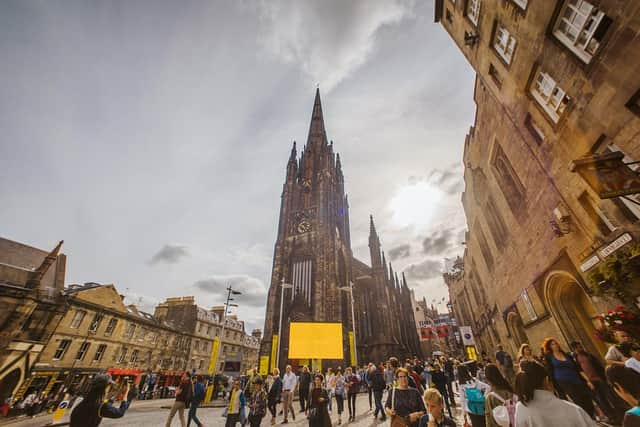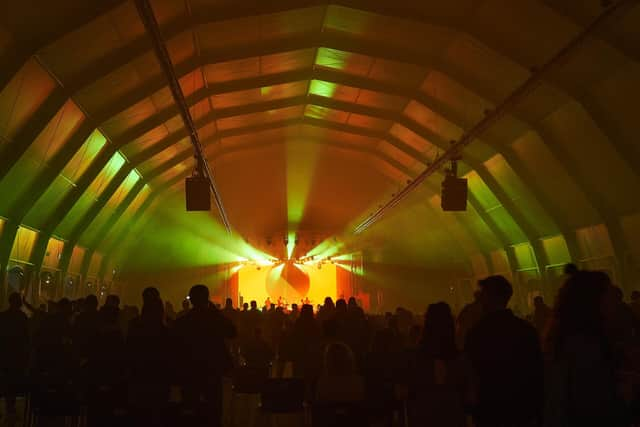Edinburgh’s festivals: New investment needed to retain ‘world-leading’ crown
The new “2030 vision” warns investment is needed for new infrastructure, venues and support for workers to help the festivals cope with the impact of Brexit, Covid, climate change, the war in Ukraine and the cost-of-living crisis.
It also stresses the need for action to tackle long-standing concerns over working conditions in some venues, the concentration of events in the city centre, and the “over-commercialisation of public spaces”.
Advertisement
Hide AdAdvertisement
Hide AdThe vision, which both the Scottish Government and the city council helped draw up, backs the idea of the festivals spreading out more across the city, and suggests they should be factored into the design of new developments and regeneration projects.
It highlights how the festivals, which get around £10 million in public funding and have been valued at more than £313m to the economy, have suffered a 30 per cent "real terms reduction" support since 2008. The UK Government’s “levelling up” fund and the Scottish Government’s proposed tourist tax are among the possible sources of new funding.
The new blueprint has been published by Festivals Edinburgh, the umbrella organisation that has brought together senior figures in the city’s major events since 2007, and the Edinburgh Festivals Forum, which the council, the Scottish Government, events and tourism bodies and Edinburgh University sit on.
It is the latest in a series of reports to tackle long-standing concerns about the staging of the festivals and how they should evolve in the aftermath of their Covid-enforced cancellation in 2020.
Recommendations included “dispersing" events across the city to tackle concerns over the exclusion of outlying communities, putting in place more support for venue workers and freelancers, and challenging “power imbalances” in the cultural sector.


Last month the Fringe Society unveiled its own long-term vision, which includes pledges to “red-card” rogue venue operators, protect the city’s green spaces, become a carbon net zero event by 2030 and stage a free family event in a different part of the city each August.
The new vision has been published months after the city’s main festivals pledged collective action on the climate crisis, including cutting back on the use of flights, and encouraging performers to spend longer in the city.
Advertisement
Hide AdAdvertisement
Hide AdThe blueprint commits the festivals to influencing the “attitudes and behaviours of artists and audiences beyond the city”.
But it also highlights the need for “more resilient” infrastructure and clean power in key public spaces, adding: “Particular key areas of focus will include the refitting of historic city venues to modern standards, and the planning of new cultural infrastructure aligned with sustainability targets.


The blueprint states: "Sustaining the attractiveness of Edinburgh’s cultural quality of life requires infrastructure plans backed by many levels of public and private support.”
Edinburgh: City of Imagination, published ahead of the 75th anniversary of the festivals, admits the “pace of growth and globalisation” was being increasingly felt in the city by 2019. It recalls the “critical need” to tackle concerns over sustainability, growing visitor numbers and the surge in properties being use for short-term lets, amid “polarised” debates on how to manage an event on the scale of the football World Cup and the Olympics.
However, the new vision insists it is vital the festivals “regenerate to a scale of global ambition”, with a collective push required from the festivals, national agencies and governments to “reimagine” their international spirit in the face of the climate crisis, the ongoing pandemic, the war in Europe and “a geopolitical landscape sometimes ominously compared to the 1930s”.
It suggests Edinburgh could champion “ideas for a progressive new era” and host a modern-day Creative Enlightenment, which encourages a “much-needed transition to a more sustainable and peaceful feature”.
Simon Gage, chair of Festivals Edinburgh, said: “All of the festivals believe in this strategy and want to see it delivered. We see it is essential to our future flourishing.
Advertisement
Hide AdAdvertisement
Hide Ad“It’s powerful because it embraces 11 festivals and all our funders and stakeholders.
“We’re all excited about the future, but we’re in a period of recovery and a decade of massive change, maybe the greatest the festivals have had to experience since they were founded.He added: “Covid has hit us hard and we’re not out of the woods yet.
The blueprint suggests demand from local communities, businesses and the artistic community to "see more festival experiences widely distributed across the city" was matched by a desire among many festivals to stage work in different neighbourhoods if there was sufficient local demand.
The new vision states: “Cultural workers, who have seen worse Covid losses than any other sector, want to see more diverse, accessible, sustainable and fair festivals as part of national rebuilding of the creative economy.
“Community representatives have highlighted environmental protection of the city centre and the over-commercialisation of public spaces as key concerns, and that they would like festival offers distributed more widely across the city.
“Businesses, universities and colleges have stressed the need for Edinburgh to re-establish itself as a world city, for the exchange of ideas and talent, and to enhance regional prosperity.
"Scope for expansion is often dependent on confidence that wider audiences will attend on a scale that will make such shows financially viable, driven by factors such as city transport infrastructure.
Advertisement
Hide AdAdvertisement
Hide Ad"Beyond the central area, investment through development and regeneration initiatives could help to test new citywide offers – in the knowledge that post-pandemic, many artists and festival organisers cannot afford the risk of exploring these opportunities alone.
"The coming years offer scope for funders and festivals to work together to secure resources so that festivals can support the establishment of new, more widely distributed cultural and creative economy hubs – and development plans can take account of the vital contribution of creatives to a thriving city."
However the vision urges caution over supporting the "enterprising creativity of individual artists and organisers.”
It adds: "Edinburgh must avoid over-commercialisation which could affect its world-class quality of life. It remains crucial to reinvest in the management and quality of the city environment, and support a balance between income-generating and subsidised activities."
Comments
Want to join the conversation? Please or to comment on this article.
